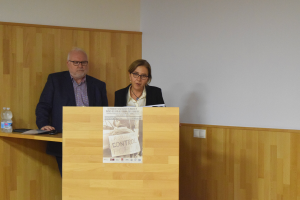SECOND INTERNATIONAL SEMINAR: A JOURNEY THROUGH THE PUBLIC HEALTH OF SOUTHERN EUROPE AND BRAZIL FROM THE 20TH CENTURY TO THE PRESENT
The Health Reforms in Brazil and Southern European Countries in the 20th Century second international seminar was held over November 15-16, 2019 on the UMH Sant Joan d’Alacant Campus. This event, coordinated by the Vice Rectorate for International Relations, forms part of the activities organized by the Tordesillas Doctoral School of Public Health and History of Science, which itself is part of the Tordesillas Group.
The organization of this seminar aimed to create an international space that reached the entire university community. María Pastor, International Doctorate Director at the UMH, affirmed that these types of activities carried out within the Tordesillas Doctoral School of Public Health and History of Science represent “an opportunity for cooperation that extends beyond international mobility.”
Public health, understood as a discipline focused on the promotion of health and prevention of illness, should not only be studied by those within the field of the health sciences. Other disciplines should form part of this process of study and research. This was precisely the aim of this international seminar, to focus on promoting this perception of public health.
According to Enrique Perdiguero, a UMH History of Science professor and responsible for organizing the seminar, the Spanish health system is focused more on a healing system. “When I speak about the Spanish public health system, I not only do so on hospital care, but also on the groups formed by different specialties that are organized for preventive actions against illness,” assures Perdiguero.
For Ana Mehnert Pascoal, a professor from ARTIS – University of Lisbon (Portugal), among the specialties involved in health reform in matters of public health, the investigative role in disciplines such as history, anthropology, sociology, and psychology must be highlighted.
Seminar workshops addressed the origins of public health right up to the present day via a tour of the strengths and weaknesses of different historical contexts in countries that included Italy, Greece, Portugal, and Spain. Guido Giarelli, a professor from the Italian Magna Græcia University of Catanzaro, stressed the factors that affected each stage of change and explained the different health system models throughout the 20th century, divided into four macro European regions: north, south, center-west, and center-east.
Other points addressed in session seminars included the interest in exchanging ideas on the processes and stages of different health reforms undergone throughout the former century, and not only in continental Europe, but also Brazil. This was accomplished in the informative sessions presented by professors María Cristina Da Costa Marques and André Mota from the Brazilian University of São Paulo. This concluded with comparisons made between the management, understanding, and starting points of public health in European countries and Brazil.
The seminar’s final portion focused on Spanish health reforms. Inmaculada Hurtado, a professor from CEU Cardenal Herrera University (Spain), and Aida Terrón, from the University of Oviedo (Spain), presented the different international dynamics in sexual education during the Spanish transition to democracy that began in 1975. Then, Eduardo Bueno Vergara and Enrique Perdiguero Gil, both UMH professors, pointed out the limits and resistance that exist in Spanish social security.
The Health Reforms in Brazil and Southern European Countries in the 20th Century second international seminar concluded on the importance of understanding how former health reforms and the historical factors have affected today’s public health, and occupy a leading position.
